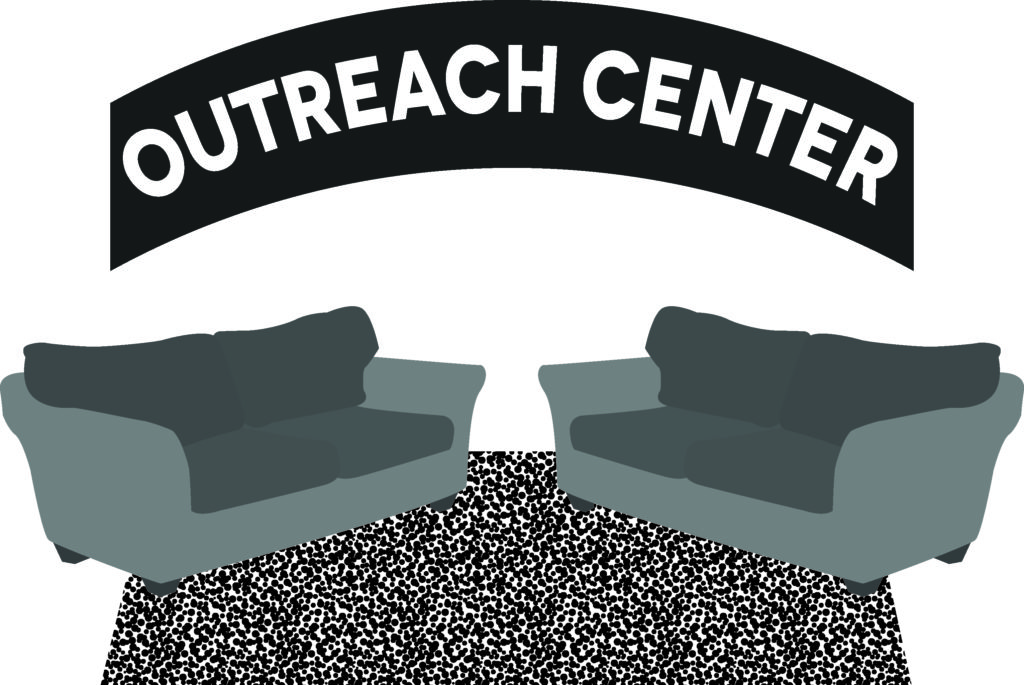First-Gen Students, Veterans Find Home in Outreach Center
First-generation and veteran students can find a new home on campus: the newly opened Outreach Center provides community and guidance for students who are first-generation or have veteran status, as well as dependents of those in the military.
Configured as more of a lounge, the Outreach Center is a space where students can go during breaks between classes or when they’re in need of a place to relax, socialize or grab some coffee. The center, housed in Student Center 110, is designated specifically for first-generation and veteran students. However, Graduate Coordinator for Student Success and Retention Guillermo Sandoval notes that they would never turn away students who don’t identify either of those groups.
The Outreach Center took over the space previously used by the Veteran Resource Center and the Redhawk Resource Hub. It was created as a way to repurpose the space, while keeping services needed in mind.
“We felt the need to transition the space to be more intentional about providing services to specific populations,” Sandoval said.
A major goal of the Outreach Center is building community, especially as students are in their first year. First-generation Seattle University student and Outreach Center Advisor, Jenny Bautista, stresses the importance of community, such as the Outreach Center, for first generation and veteran students.
“It’s just a good place to find community…I think the more people come here they really find that,” Bautista said. “I think now that this space is here we’re actually going to be able to tell how much of a need there was for it.”
A particularly impactful service for students that the Outreach Center provides is the textbook exchange program. The center has gathered a small library of textbooks that are available for students to rent for free on the Outreach Center’s page on ConnectSU. The service is open to all students, though first-generation and veteran students do have priority. The Outreach Center has also donated $35,000 worth of textbooks to Seattle Central College, which Seattle U students have access to as well.
The Outreach Center has also initiated the “I’m First Gen” campaign. This is a campaign in which students and faculty display cards which read “I’m First Gen”, with students using blue cards and faculty using yellow. These visuals are also available on the Outreach Center website for use on social media.
“By having those visible, they commit to being open to conversations with other first-gen folks,” Sandoval said, noting that a main goal of the Outreach Center is to build community and visibility within the university among first-generation and veteran students.
Another way in which the Outreach Center is working to increase visibility of students is through their program “Imprint,” in which students, faculty, and staff who are first generation can submit writing proposals sharing their stories and experiences. The submission deadline for this program is Oct. 27, and publication of “Imprint” will be in spring of 2018.
Throughout the year, there will be continued events such as First Gen Fridays, in which students, faculty and staff who are first generation can join together every other Friday to discuss a given topic.
For veterans on campus, the Outreach Center brings in additional services such as representatives from the Veterans Affairs to help students sign up for healthcare and other benefits, while aiding through the process if there are any issues to be resolved.
Tom Hove, a veteran himself and the Outreach Center’s Veteran Navigator, has found that the center fills a significant gap in communication with veterans.
“People don’t know that they’re able to be connected to healthcare or different services,” said Hove. “So, we’re able to say, ‘Yes, you are, and we’ll provide that right here on campus—that connection.’”
In addition, many veteran students are coming to campus very soon after their time of service, meaning that Seattle U is where they are facing many major transitions.
“You spent a minimum of two years in the military and now you get out and you have to wrap your mind around everything and figure out how to be a normal functioning human being again, and sometimes that is super super difficult,” Hove said. “It doesn’t happen overnight, so we are catching people in the midst of it.”
To aid in this transition, the Outreach Center is starting a program called #Pause. This program will be creating de-stress kits for veterans and connecting with the VA in order to learn coping mechanisms and self-care techniques.
The Outreach Center will also be working with Project Canine, a group which provides therapy dogs for veterans, in order to continue this service from last year.
Hove concluded by stressing that he is here to serve the students and guide them through any challenges they face in their time as students.
“I tell people, if you need help academically, professionally, or personally, I’m here to help you,” Hove said.
Sofía may be reached at
[email protected]





